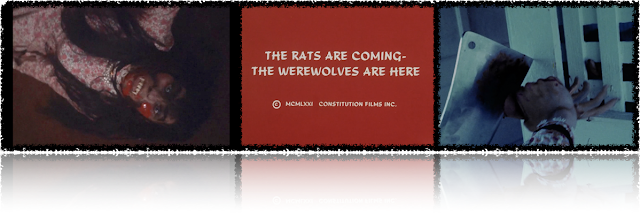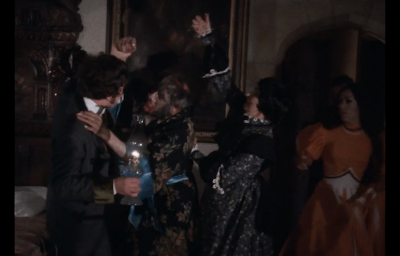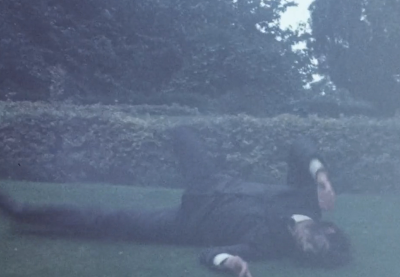We continue to dig through the filmography of Mr. Andy Milligan and find gem after sparkling gem. Today's film, originally titled The Curse of the Full Moon but retitled after some footage inspired by the success of Willard (1971) was added, is The Rats Are Coming! The Werewolves Are Here! (1972)
The dismay your universe's critics display when reviewing Andy Milligan films is almost psychotically unbelievable. For example, reviewer BA_Harrison writes, "I can't find anything good to say about it. Not one thing." Reviewer The_Void writes, "Overall, I wouldn't be callous enough to recommend this dross to even my worst enemy and you should take that as a reason not to bother seeing it." And reviewer planktonrules writes, "The film reaches levels of amateurism that are hard to believe and you just have to see it to believe it."
Please, for goodness sake, read on for the truth about Andy Milligan's The Rats Are Coming! The Werewolves Are Here!...
On the grounds of a decaying mansion in the 1890s, introduced via three establishing shots at the beginning of the film that pan across the gardens to the house, two vagrants attack a third vagrant and light him on fire before the residents of the mansion rescue him, yelling at each other throughout the process.
Mortimer and Phoebe Mooney, the brother and sister who rescued the vagrant--their younger brother--drag him to a room and chain him to the wall while arguing about who unchained him. In a statement that reveals the characters’ relationships as well as Andy Milligan’s approach to drama, the man says, “Monica hates everything and everybody. She’s just one big hate.”
Later, Phoebe yells at the family patriarch, Papa, causing him to have a heart attack, which Phoebe cures by stabbing a hypodermic needle into his shoulder. Then Phoebe and Mortimer talk about their younger sister Diana, who is to return to the family mansion with her husband. They have this conversation while a shirtless young man in the background tosses birds across the room and embraces a white rabbit.
At the dinner table, Phoebe and Monica yell at each other. After Phoebe sends Monica to her room, Mortimer says, “It’s not going to be very pleasant around here for a while, you know that, don’t you?”
Phoebe retorts, “Has it ever been, so long as you can remember?”
“Come to think of it, no.”
A howl comes through the walls, a sound that Phoebe and Mortimer assume is Monica torturing their vagrant brother Malcolm again.
When Diana arrives at the mansion, she introduces her husband Gerald. The couple goes to their room, where Diana conveniently explains more backstory: “I gave up half my life looking after him while Phoebe took care of the rest of us I ended up looking after Papa.” (There was probably supposed to be a period somewhere in that sentence but the actress playing Diana delivers it without a period, or a comma, or any other punctuation.)
Monica enters to introduce herself. “Hello, I’m Monica, the middle sister. The bitch. The one they always talk about behind her back.” She adds about her apparent eavesdropping, “With a voice as loud as yours, it’s not difficult to be heard, unless you’re deaf of course, and the only dummy we have around here is Malcolm. Oh, you mean you haven’t met our youngest brother Malcolm. Hasn’t Diana told you everything about her fantastic family?”
Diana pushes Monica out of the room, as would anyone in her position. Gerald asks about Malcolm, informing his wife, “It’s telling each other everything that makes a love strong, so that no one person or thing can destroy it.”
Diana informs Gerald that Malcolm is “almost animal-like. We don’t know how it happened. The genes get mixed up at conception and he never developed into a normal baby.” Diana then lists each sibling and their age, until she reaches herself. “As you know, I’ve just become 21. That’s why I couldn’t marry you last year when you asked me. Papa wouldn’t have allowed it, and I had to come of age in order to give my consent.” Also, Diana has a different mother from the others because their mother died due to a mysterious poisoning, and Diana’s mother died in childbirth.
Gerald then tells Diana his background, which involves a rapist father, a mother dying in shame, and nuns who hated Gerald. The two embrace, having learned a great deal about each other now that they’ve been married and are moving into the Mooney mansion.
Next, Diana (and her puffy orange dress) sees Papa alone, and Papa tells her more backstory she presumably already knows. “Because of my age and my health, I decided to send you to medical school in Scotland so that you would be able to help me carry on with my experiments. You know how important those experiments are for the family’s existence. If I died tomorrow, there would be no one to carry on those experiments except you. That was the reason for letting you go. Our family’s like no other family that you know.”
After Papa yells at Diana and Diana yells at Papa, Papa has another heart attack. Diana gives him another injection in the shoulder. Diana asks about the formula they are injecting into their father, “You still grow it in the back garden?”
Phoebe tells Diana she needs to work on the formula to save Papa, who means more to her than to the rest of the family. When Diana asks why, Phoebe stares into the distance. “I’ll tell you, Diana, someday. I’ll tell you someday, when the time is right.”
Later, Phoebe and Monica prepare vegetables for dinner in a hallway, for unknown reasons. Monica explains that she hates Diana because as a child Diana arranged things to blame on Monica that weren’t her fault, but Phoebe is skeptical. “I think you have a vivid imagination, and that you imagine a lot of things that aren’t true.” (Clearly, part of the Mooney family curse is the inability to speak without repeating oneself over and over, multiple times.)
Monica gives Malcolm his food, which consists of raw meat. She tortures her brother first by dripping candle wax onto his leg, then by whipping him with a belt while chickens flap around the room.
That night, Gerald tries to convince Diana to move back to Scotland. In the middle of their conversation, they hear Malcolm howling, and Diana says it will be worse tomorrow night when the moon is full. Gerald and Diana argue some more, then go to bed. Malcolm howls again, so Diana says, “I must talk to Papa about Malcolm.”
In a strange interlude in the middle of the night, Monica and Phoebe and Mortimer converge in one of the rooms of the mansion, surrounded by fog, and they walk in circles while Malcolm howls. There are also shots of Malcolm doing something like ripping an animal apart, the evidence of which appears in the morning as there are small body parts all over the floor, scattered among some horrifically ripped-up vegetables.
After some more arguments about leaving the house and/or continuing experiments to cure the family curse, and an unpleasant scene in which Monica tortures a real live mouse, Diana (in her puffy orange dress again) tells her brother Mortimer that she’s pregnant. “I don’t think this family stands a chance of surviving as a whole for very much longer,” she tells her brother eloguqently. “I think we’re on the verge of destroying ourselves.” She adds, “My unborn baby is the only answer.”
In another odd scene, Monica visits what is called “the city” (actually, the inside of a dark house) to meet with a zombie with the Dickensian name of Mr. Micawber.
The two get into a protracted discussion about the inefficiency of politeness, humorously wasting more time talking about politeness than being polite. When Mr. Micawber asks how Monica’s sister is, she says, “Do you really care?”
“Well, no, not really, I guess.”
“Well then, why ask?”
“Well, it’s the thing to do. One doesn’t go about without asking how’s your sister. Manners always were a complete waste of everyone’s time. If more people got to the point, they wouldn’t go about cluttering up their day with a lot of nonsense. Now don’t you agree?”
“I couldn’t agree more.”
Moments later, Micawber says something about great expectations, then says how much he admires Dickens, though Monica brushes off the topic of dicussion because Dickens died. Eventually, Monica admits that she has come to the city to see Micawber because she killed her pet mouse and now she would like some rats to use as pets (and presumably, sadly, torture victims).
When offered a drink of alcohol, Monica replies with a classical reference of her own: “We the Mooneys don’t drink…alcohol.” He asks what they do drink, “as if I didn’t know.”
Micawber tells Monica that he has raised a group of rats in a cage, feeding them only the flesh of cats and dogs for unknown reasons…and one night he fed them the body of a dead old woman, which resulted in the rats eating his own left arm and part of his face. Of course, Monica says about the flesh-eating rats, “I must have them.” She buys all the rats.
“I’ll wrap them for you,” Micawber says.
Back at the Mooney mansion, Gerald learns still more about the family curse(s). When Monica attacks Gerald by jumping out of a wardrobe with a knife, he throws her to the bed, where she falls onto Gerald’s crucifix and fog billows up as if she’s been burned. Gerald mentions this curiosity to Diana, but she brushes it away, saying it was just dust on the bed. “And darling, put your Mama’s cross away, why don’t you?”
Monica then spends some time naming each of her new rats; cleverly, she names one of the rats Willard and another one Ben, though Ben is clearly a rubber toy. When Ben “bites” Monica, she stabs the poor rubber toy to death. She also tries to return the rats to Mr. Micawber, apparently regretting her purchase of flesh-eating rats because one bit her. She confronts the man/zombie, allowing Andy Milligan to showcase one of his signature camera moves: swinging the camera madly back and forth while (for some reason) the room catches fire.
Later, Diana walks the streets and finds a vendor in a stall. “I’m looking for a gun,” she tells the man.
“Oh, to purchase?” he asks, probably wisely, as ambiguity is never helpful when one is looking for a gun. To help her narrow down her options, he asks, “Just how large is the game you plan to kill?”
“Well, about the size of…I’d say about your size,” Diana says, perhaps unwisely. She explains she is planning to kill a large dog.
As he sells her a pistol, the vendor babbles on and on about enjoying the company of people for something like half an hour. Eventually, Diana buys the pistol for three pounds. Then, not at all suspiciously, she hires the vendor to melt down her husband’s silver crucifix and, again not at all suspiciously, create silver bullets that can be fired from the pistol. Of course, the vendor agrees.
Meanwhile, Monica brings Malcolm some food and starts whipping him with a belt until she is interrupted by Phoebe, who scolds her for torturing their brother. Then Monica has a conversation with her next door neighbor and friend, Rebecca, who tells Monica she can see the goings-on inside the Mooney house from her own house at night. Given no choice, Monica enacts a classic Andy Milligan murder scene in which Monica entices Rebecca into the garden by repeating her name, then chops off her hand with a conveniently placed meat cleaver, finally stabbing her in the head with a shovel, though this final act of murder is so shocking the screen turns orange instead of showing such a horrific scene.
Returning to the intense family drama of the Mooneys, Diana (still in her puffy orange dress) visits Papa and tells him she is pregnant, which convinces him to see Gerald. Papa interrogates Gerald alone in Papa’s bedroom. Papa eventually explains the family curse to Gerald. “The Mooneys are a very, very old family. They go back for many, many centuries. They came originally from Northern Europe. Once, they were immensely rich. They had great holdings of land…Three centuries ago, my great-grandfather was bitten by an animal. This animal was afflicted with a dreaded disease which was passed on to all members of the family through the birth of each new child. At the time of this accident to my great-grandfather, there were few descendants of the Mooneys. A plague had taken them in the region where they lived. The Mooneys dwindled until it was only this family left. None of the Mooneys had any chance of marrying except Diana, and it is a chance we’re taking to let her have her baby. Diana’s mother was of clean blood when I took her for my second wife.” He also says his second wife died via poisoning. Then he claims to be 180 years old. “That is why I need my shots.” Growing exhausted, he tells Gerald the future will hold many wonders, and that “My Diana will contribute to the future of the new world by continuing my…my experiments with the plants in the backyard.”
Unfortunately, Papa has another heart attack at the exact same time as the lycanthropic Malcolm breaks into the room. The werewolf attacks Gerald.
Everyone enters the room, saving Gerald by injecting Papa’s serum into Malcolm. Malcolm falls down, unconscious, while Papa unfortunately passes away. At his deathbed, Phoebe takes the opportunity to admit to both committing incest with Papa (giving birth to Malcolm) and also poisoning Diana’s mother. “I don’t expect either of you ever to forgive me,” she says to her brother and sister (though not to her other brother Malcolm, who might have some interest in the matter).
In a sudden, if confusing, shock, Phoebe turns around to look back at Papa and faces her siblings, having herself transformed into a werewolf. Then Mortimer transforms unexpectedly. He kills Phoebe and Malcolm while Diana and Gerald run back to their bedroom.
Diana explains to her husband that she stole his mother’s crucifix and had it melted down into silver bullets. The two of them find the werewolf bodies in Malcolm’s room, and then are attacked by Mortimer. They run out of the house, onto the foggy lawn, and Gerald shoots Mortimer, who transforms back into his human form and dies.
After all her relatives are dead, Diana tells Gerald she plans to stay in the house forever, even though he wants to return to Scotland. She laughs, revealing her true colors: “You, my darling, are not going anywhere. You see, I don’t need you anymore. You’ve served your purpose. You’ve sired my baby. And I really don’t see any further use for you. You see, there’s one little thing I forgot to tell you. I am different from the rest of my family.” She turns around. “I can change myself at will.” She turns back to Gerald, showing her werewolf form, and she kills him.
In the film’s coda, Diana sits in the back garden with an elderly neighbor woman who, for some reason, finds the arbitrary name Petunia hilarious.
With the werewolves (nearly) all murdered and the rats having been returned to the store where they were purchased, the film simply ends.
Much could be said about Mr. Milligan's werewolf/rats film, but we shall focus on only two small details of the film that demonstrate what an auteur Mr. Milligan was. The first is the pairing of characters named Monica and Phoebe two decades before the (admittedly obscure) situation comedy Friends recycled the same characters, though depicting them for some reason with slightly less lycanthropy and incest. The second detail is the charming extended scene in which Monica socializes with her neighbor Rebecca, who is either 13 or 45 years old. Before Rebecca is relieved of her hand by Monica's cleaver, Monica (played by Andy Milligan veteran Hope Stansbury) engages in a long monologue that by turns delights and horrifies Rebecca. In the middle of the monologue, set like the rest of the film in the 1890s, Ms. Stansbury is startled by the sound of a car horn. She recovers after a moment and continues her speech, only to be interrupted again by a sharp beep. This time, however, she barely registers the perhaps anachronistic sound and continues to the end of her monologue. It is a sign of Andy Milligan's talent as an auteur that he continued shooting through the mildly annoying interruption and decided to use Ms. Stansbury's carefully crafted performance in its entirety. What more can be said about the films of Andy Milligan? His devotion to his craft and the performances of his actors makes him one of the finest filmmakers of the 1970s, an auteur among auteurs, and The Rats Are Coming! The Werewolves Are Here! is almost certainly his finest film with two exclamation points in the title.











